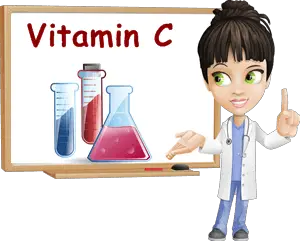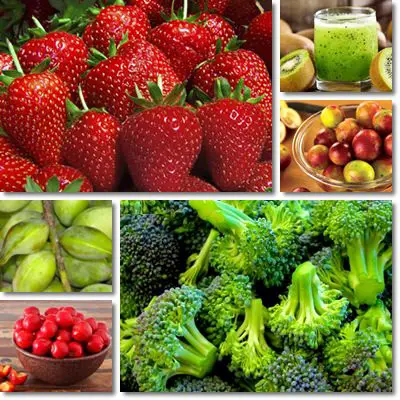Ascorbic acid, best known as vitamin C, is one of the most potent natural substances available to man. Being an incredibly powerful natural antioxidant, anti-inflammatory and antibacterial, vitamin C is essential for good health. Since our body cannot produce it itself, it is left to our diet to supply us with vital amounts of ascorbic acid. It is important to remember that vitamin C deficiency can cause serious health problems ranging from premature teeth loss and poor wound healing to inflammation and increased cancer risks.
The benefits of getting enough vitamin C from either dietary sources of supplements, or both, range from increased absorption of iron and anemia prevention and management to less wrinkles, less severe respiratory tract infections, better recovery following disease, fast wound healing, anti-allergy properties, beneficial action on the endocrine system, lower risks of cardiovascular disease, better energy levels and a feeling of an overall improved health.

What are the functions of vitamin C?
Vitamin C performs a myriad of functions within our body such as:
- It has antioxidant activity, scavenging for free radicals that damage cells and DNA.
- It has anti-inflammatory effects, actively reducing inflammation markers in the body.
- Prevents cardiovascular disease by helping prevent and clear plaque deposits on the inside of artery wall and through collagen synthesis which helps maintain blood vessel elasticity and endothelial health.
- Helps with the production of neurotransmitters and hormones for the nervous system and endocrine system.
- Stimulates the immune system response, essentially making the immune system respond more aggressively to pathogens and disease, as well as contributes to the immune system function by supporting the production and health of white blood cells.
- Promotes faster wound healing via collagen synthesis, anti-inflammatory and antibacterial pathways.
- Exerts antiaging properties by stimulation collagen production which contributes to better skin elasticity and fewer or less noticeable wrinkles, delaying aging signs.
- Boosts iron absorption for increased vitality and elevated energy levels.
- Boosts fertility in women by regulating progesterone production – progesterone is one of two major female hormones that sustains fertility, helps fixate the embryo in the uterine wall and supports pregnancy development.
- Essential for teeth health – a severe deficiency of vitamin C results in bleeding gums and tooth loss.
- Anticancer benefits: vitamin C functions as an antioxidant, anti-inflammatory, antimutagenic, anticarcinogenic, anti-proliferative and apoptotic agent.

What are the benefits of vitamin C?
Vitamin C has remarkable antioxidant activity, meaning it protects our body from the health damages caused by reactive oxygen molecules called free radicals, which cause the so-called oxidative stress. Free radicals can be found everywhere from the the air we breathe to the invisible blue light our eyes take in and can damage practically every cell in our body. In time, cell damage accumulates, causing inflammation and disrupting normal cell activity.
This sets the tone for more serious medical conditions such as atherosclerosis, heart disease, stroke, even cancer. Because of its antioxidant properties, vitamin C repairs cell damage and prevents it from reaching tissue levels. Also, vitamin C-rich foods help the body accumulate another potent antioxidant, vitamin E.
As far as cardiovascular health is concerned, vitamin C helps combat hypertension. By lowering high blood pressure, this antioxidant-vitamin prevents any further cardiovascular damage that might arise from the previously mentioned condition. Moreover, due to its regenerative effects, it maintains healthy blood vessels by binding to cholesterol and toxins and eliminating them.
In addition to lowering blood pressure, it ensures the proper dilation of blood vessels. This means cholesterol cannot easily obstruct arteries and ensures an adequate blood supply to the heart, thus preventing a condition called angina pectoris (chest pain).
A generous vitamin C intake stimulates the immune system. This means we get to enjoy strong, healthy teeth and gums, strong bones and an overall better resistance to colds and infections by increasing white blood cell production. Vitamin C is a great antibacterial and a natural antihistamine, reducing the most unpleasant effects of the common cold: inflammation, stuffy nose, muscle pain and so on. Also, vitamin C helps wounds heal faster.
Vitamin C can help us look fresh, young and radiant as well by stimulating collagen production. Collagen is the main structural protein in our body, also known as the thing that holds everything together. Without ascorbic acid our body could not produce collagen. And without collagen, let’s just say that wrinkles would be the last of our worries.
Last but not least, vitamin C significantly reduces lead levels in the blood. People living in large urban areas have significantly higher lead blood levels. Lead toxicity may cause severe behavioral changes as well as kidney damage and high blood pressure. Vitamin C helps eliminate toxins from the blood, thus removing any dangerous amounts of lead.
Conclusion
Overall, vitamin C has wonderful health benefits and meeting daily requirements should be a priority. I must admit I take 1.000 mg (1 g) of vitamin C almost daily and, honestly, I have never felt better. I feel more energetic, I even lost some weight, I have a growing appetite and my resilience and sleep quality have improved significantly. I know many people believe that vitamin supplements are useless and possibly also harmful, but they do support good health since our body relies on essential nutrients daily.
Everyday stress, pollution, hasty eating, processed foods, all take a toll on our health and we need vitamins, in whatever form they come in, to keep us healthy. If you are against synthetic supplements, yet have a deficiency, at least find out which foods you should eat in order to supply your body with what it needs. Do the same in every aspect of your life: read, read and read some more. Stay informed and make informed decisions.
